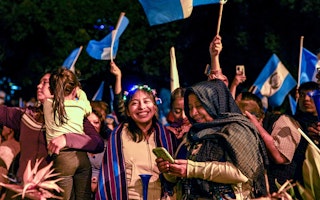Elections for national and local government are an essential part of an open society. A free vote gives people the chance to choose those who wield political power on their account, and the power to dismiss those in government if they fail to deliver on their promises. Elections bring into sharp relief issues of democratic access, good administration, transparency of processes, independent media, right to assembly, corruption, and human rights.
The Open Society Foundations support efforts around the world to protect and support election integrity. This work is entirely nonpartisan. We support the process, not any particular political party or candidate.
Safe and Secure Voting
Free and fair elections require much more than working on polling day to ensure that polling places are secure and safe, and that votes are counted properly. During a campaign, for example, those already in power can skew the field by depriving their opponents of fair access to the media. By denying voters the right to register, making it difficult to get to polling stations, or gerrymandering voting districts, meanwhile, they can reduce voter turnout. Campaigns can foment violence—or the threat of it—to intimidate their opponents. And they can use social media to spread misinformation. Much of the effort to address these issues is conducted at a local and national level, and Open Society supports a range of organizations around the world who are engaged in the struggle.
Open Society also supports global efforts like the Annan Commission on Elections and Democracy in the Digital Age to generate a set of recommendations on how new technologies, social media platforms, and communication tools can be harnessed to strengthen the integrity of elections—as well as how their harmful effects can be mitigated. Open Society has also funded ELECTOR, an initiative from the United Kingdom’s University of Birmingham that brings together practitioners and researchers to surface best practice ideas on election observation.
Fair Processes for Registration and Voting
In the United States, Open Society supports state groups that seek to make it easier to vote, such as the Black Voters Matter Fund, which works to promote voter participation among African Americans and lower-income communities. Other grantees have challenged efforts to remove voters’ names from the register without due cause. In the European Union, meanwhile, Open Society has supported efforts to boost electoral participation by informing citizens of their rights to vote in European elections anywhere in the Union—not just in their home country.
More broadly, we support nonpartisan efforts that encourage participation in the electoral process. We support efforts to engage Roma communities in national and local elections, so that candidates are able to elevate issues that are important to Roma communities, for example. And in late 2018, Open Society’s foundation in Armenia responded to a sudden snap election by funding TV debates among the candidates, so voters could make an informed decision.
Combating Corruption
Open Society is among the many funders of groups like the Campaign Legal Center, which monitors and challenges abuses of campaign financing rules in the United States. Similarly, our North Macedonia foundation has worked extensively on monitoring election campaign financing, as well as monitoring the financing of media institutions and political parties. Our Mongolian foundation, meanwhile, has funded monitoring and reporting by civil society partners and journalists, who have in turn raised public awareness concerning the sources of campaign financing.
Standing Up to Intimidation
The Open Society Initiative for West Africa has developed an innovative “Situation Room” model for engaging civil society throughout an electoral campaign. The model empowers networks of partners to collect and disseminate relevant information—including any threats or reports of violence. Similar efforts have been undertaken across other parts of the continent, as well as in Albania. The International Renaissance Foundation of Ukraine, meanwhile, prepared for the country’s 2019 elections by improving the safety of civic activists—many of whom were harassed during the campaign season.
Fighting Disinformation
In 2018, during elections in Mexico, Open Society supported work to recognize, investigate, and counter online disinformation campaigns. We also supported Verificado, an effort that engaged dozens of journalists, who then organized live fact-checking of candidate statements during debates and public appearances.
In Europe, we have supported efforts to expose disinformation campaign targeting in both EU and national polls. Our foundation in South Africa supported Media Monitoring Africa, which worked in partnership with the South African independent electoral commission to monitor and combat misinformation, and to resist attempts to harass journalists. Meanwhile, in 2018, our foundation in Armenia supported two monitoring campaigns—one to highlight and measure the impartiality of media coverage, and another to monitor and expose fake news and other forms of disinformation.
Read more
State of Democracy
Q&A: In a Year of Elections, a Podcast Takes Stock of Democracy

More people are going to the polls in 2024 than ever before. Oxford University’s Ben Ansell has been taking a global look at both the strengths and challenges of the process as host of the What’s Wrong with Democracy? podcast.
Racial Justice
Litigating for the Statistical Visibility of Afrodescendants in Colombia

Afro-Colombians have long endured social and systemic invisibility. Through legal action, civil society is fighting the miscount of the Black population for a more accurate representation.
A Critical Year Ahead
2024’s Wave of Elections: Referenda on What?

President Mark Malloch-Brown discusses what the next year holds for democracy and human rights, and how we’re meeting the challenges ahead.